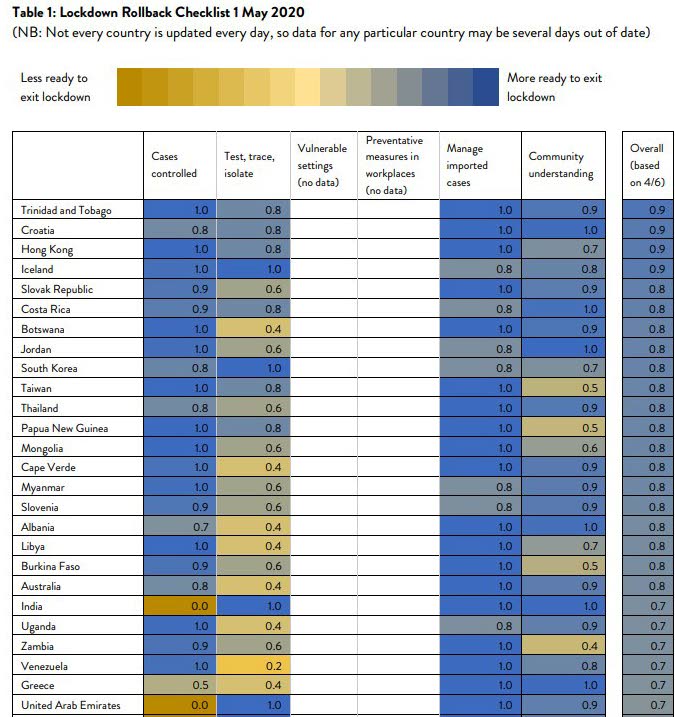Lead researcher: Oxford checklist is not ‘praise’

DR THOMAS Hale, the man in charge of the University of Oxford Covid19 Government Response Tracker (OxCGRT), says the report is not an evaluation of a country’s performance.
On Friday, TT was in joint first place on an updated covid lockdown roll-back checklist produced by Hale’s team. TT’s high ranking has been welcomed by Health Minister Terrence Deyalsingh, and others have interpreted the findings as “praise” for TT’s efforts.
Others have cast doubts on the authenticity of the survey.
Responding to questions posed by Newsday via e-mail, Hale, the lead researcher on the study, gave insights as to how the list and the accompanying research paper should be interpreted.
“The checklist shows which countries have policies in place that correspond to four of the six World Health Organisation (WHO) recommendations for rolling back lockdown. The checklist does not record how well these policies are implemented,” he said, on testing, for example.
“As such it is not an evaluation or ranking of countries’ performance. The purpose of the tracker is to help compare governments’ official policies. But more analysis is required to evaluate their effectiveness.”
TT SHARES TOP SPOT
The OxCGRT was created by Oxford’s Blavatnik School of Government (BSG) and includes a team of researchers led by Hale, associate professor in global public policy at BSG. The data is collected from public sources by a team of over 100 Oxford University students and staff from every part of the world.
The team says: “Systematic information on which governments have taken which measures, and when, can help decision-makers and citizens understand the robustness of governmental responses in a consistent way, aiding efforts to fight the pandemic.”
TT currently shares the number-one spot with Croatia, Hong Kong and Iceland in the list, which ranks countries that meet WHO recommendations for relaxing physical distancing measures.
In a previous list issued on April 23, TT was ranked second to Vietnam. The updated version includes more detailed analysis of numerous additional measures such as schools and workplaces closing, debt-relief measures, restrictions on travel and contact tracing. Newsday e-mailed Hale shortly before the updated checklist was issued.
He explained that it is currently a working paper, which refers to “a non-peer-reviewed article, which is used for early drafts to gather feedback, before they are submitted to academic journals.” Collecting data for the exercise began on January 1 and the ranking is updated twice weekly.
“Because the data is presented in real time, we update the tracker as new information comes in,” Hale said. The objective of the tracker, he added, “is to provide a comparative metric of governmental responses in order to inform public policy.
“Two update cycles are completed each week. The tracker allows governments and the public to compare governmental responses to covid19 in order to better inform evidence-based policymaking.” He also addressed Newsday’s questions about funding for the project and the potential for manipulation of data to reflect well, or poorly, on a particular country in its handling of covid19.
OXFORD REMAINS INDEPENDENT
He replied, “The tracker operates wholly through the voluntary efforts of the students and staff of Oxford University. “The information is provided free-of-charge on our website as a public service. The university never accepts donations that would influence or bias our research.”
TT and nearly 160 other countries were graded in four areas: cases controlled; testing, tracing and isolating; managing imported cases; and community understanding.
This country has a score of one, the highest achievable, for control of cases, as well as community understanding, along with other high scores of 0.8 for testing and isolation, and 0.9 for community understanding.
This gives TT a total score of 0.9. Croatia, Hong Kong and Iceland were ranked joint at the top with the same score. In comparison, the UK is languishing only four places above last-placed Iran. The first published research not did not identify the countries’ individual scores.
A research note on the study points out: “Even this ‘high level’ view reveals that few countries are close to meeting the WHO criteria for rolling back lock-down measures. “At the time of writing, only a handful of countries are doing well at the four ‘checklist’ criteria OxCGRT is able to track.”
When Deyalsingh was asked at a Health Ministry press briefing on Wednesday for his thoughts on TT’s position on the list (TT was second at that date), he said the population should not react with a false sense of security. He said, however, that the Oxford report is “a very good report” and “paints us in an excellent light.”
“This is testimony to what we have been saying all along,” Deyalsingh said, “that our response to covid, led by the Prime Minister, was a robust one...What this speaks to is that the world is recognising that the decision not to flip a switch and open back the economy is the right way.”
The Oxford team’s work can be found at: https://www.bsg.ox.ac.uk/research/publications/variation-government-responses-covid-19

Comments
"Lead researcher: Oxford checklist is not ‘praise’"